| Listing 1 - 9 of 9 |
Sort by
|
Book
Year: 1952 Publisher: New York : Doubleday,
Abstract | Keywords | Export | Availability | Bookmark
 Loading...
Loading...Choose an application
- Reference Manager
- EndNote
- RefWorks (Direct export to RefWorks)
Allegiance --- Civil rights --- Liberty --- Allégeance --- Droits de l'homme --- Liberté
Book
Year: 1997 Volume: 97/15 Publisher: Florence : European University Institute, Robert Schuman Centre,
Abstract | Keywords | Export | Availability | Bookmark
 Loading...
Loading...Choose an application
- Reference Manager
- EndNote
- RefWorks (Direct export to RefWorks)
Allegiance --- Nationalism --- Allégeance --- Nationalisme --- European Union countries --- Pays de l'Union européenne --- Social policy. --- Politique sociale
Book
ISBN: 9783515097154 Year: 2010 Volume: 19 Publisher: Stuttgart : Steiner,
Abstract | Keywords | Export | Availability | Bookmark
 Loading...
Loading...Choose an application
- Reference Manager
- EndNote
- RefWorks (Direct export to RefWorks)
Middle East --- Rome --- Moyen-Orient --- History --- Foreign relations --- Histoire --- Relations extérieures --- Relations --- Kings and rulers. --- Civilization. --- Relations extérieures --- Rois et souverains --- Allégeance --- Romains --- Proche-Orient --- Antiquité --- 30 av J-C-476 (Empire) --- Jusqu'à 622

ISBN: 0415917905 0415917913 Year: 1997 Publisher: London : Routledge,
Abstract | Keywords | Export | Availability | Bookmark
 Loading...
Loading...Choose an application
- Reference Manager
- EndNote
- RefWorks (Direct export to RefWorks)
Political culture --- Allegiance --- Patriotism --- Martyrs --- Spirit possession --- Symbolism in politics --- Culture politique --- Allégeance --- Patriotisme --- Possession par les esprits --- Symbolisme en politique --- South America --- Amérique du Sud --- Colonial influence. --- Influence coloniale --- Allégeance --- Amérique du Sud
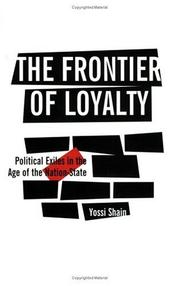
ISBN: 1282593897 9786612593895 0472026127 9780472026128 9780472030422 0472030426 0819552232 9780819552235 9781282593893 661259389X Year: 2005 Publisher: Ann Arbor University of Michigan Press
Abstract | Keywords | Export | Availability | Bookmark
 Loading...
Loading...Choose an application
- Reference Manager
- EndNote
- RefWorks (Direct export to RefWorks)
Loyalty. --- Exiles --- Governments in exile. --- Refugee governments --- International law --- International relations --- Sovereignty --- State, The --- Persons --- Aliens --- Deportees --- Refugees --- Conduct of life --- Constancy --- Political activity. --- Governments in exile --- Allegiance --- Exilés --- Gouvernements en exil --- Allégeance
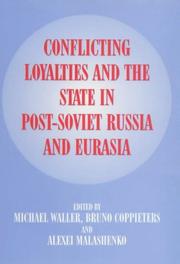
ISBN: 0714648825 071469479X Year: 1998 Publisher: London : F. Cass,
Abstract | Keywords | Export | Availability | Bookmark
 Loading...
Loading...Choose an application
- Reference Manager
- EndNote
- RefWorks (Direct export to RefWorks)
Minorities --- Allegiance --- Self-determination, National --- Minorités --- Allégeance --- Droit des peuples à disposer d'eux-mêmes --- Former Soviet republics --- Ex-URSS --- Politics and government --- Politique et gouvernement --- Droit des peuples à disposer d'eux-mêmesFormer Soviet republics --- Ex-URSSPolitics and government --- Minorités --- Allégeance --- Droit des peuples à disposer d'eux-mêmes
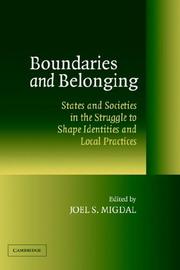
ISBN: 9780521835664 9780521068499 9780511510304 9780511194023 0511194021 0521835666 0511195400 9780511195402 0511196067 9780511196065 0511510306 1280477989 9781280477980 0511194765 9780511194764 0511194021 0521835666 0521068495 1107149916 9781107149915 0511327161 9780511327162 Year: 2004 Publisher: Cambridge, UK New York Cambridge University Press
Abstract | Keywords | Export | Availability | Bookmark
 Loading...
Loading...Choose an application
- Reference Manager
- EndNote
- RefWorks (Direct export to RefWorks)
This interdisciplinary volume maintains the importance of a spatial understanding of society and history, but suggests a way of conceiving of borders and space that goes beyond a school map of states. Its subject is the struggle among differing spatial logics, or mental maps. It is concerned with the meaning that state borders hold for people, but recognizes that such meaning varies and is contested by other social formations. To what degree do state borders encase the mechanisms that make the decisive rules governing people's lives and to what extent do they give way to other rulemakers? To what extent do states circumscribe the communities to which people feel attached and to what extent do they intersect with other communities of belonging? These essays home in on the struggles and conflicting demands on people, given that state borders are not automatically pre-eminent and that other spatial logics demand attention.
Political philosophy. Social philosophy --- Boundaries. --- Allegiance. --- Group identity. --- Collective identity --- Community identity --- Cultural identity --- Social identity --- Identity (Psychology) --- Social psychology --- Collective memory --- Loyalty, Political --- Political loyalty --- Loyalty --- Citizenship --- Patriotism --- Borders (Geography) --- Boundary lines --- Frontiers --- Geographical boundaries --- International boundaries --- Lines, Boundary --- Natural boundaries --- Perimeters (Boundaries) --- Political boundaries --- Borderlands --- Territory, National --- Frontières --- Allégeance --- Identité collective --- Social Sciences --- Political Science
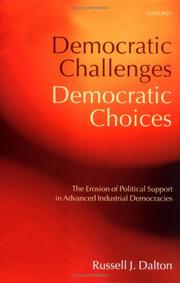
ISBN: 0199268436 Year: 2004 Publisher: Oxford Oxford university press
Abstract | Keywords | Export | Availability | Bookmark
 Loading...
Loading...Choose an application
- Reference Manager
- EndNote
- RefWorks (Direct export to RefWorks)
Political systems --- Allegiance. --- Political participation. --- Political indicators. --- Democracy. --- Political culture. --- Comparative government. --- Allégeance --- Participation politique --- Indicateurs politiques --- Démocratie --- Culture politique --- Institutions politiques comparées --- #SBIB:043.IO --- #SBIB:324H50 --- #SBIB:35H500 --- Politieke participatie en legitimiteit (referenda, directe democratie, publieke opinie...) --- Bestuur en samenleving: algemene werken --- Allégeance --- Démocratie --- Institutions politiques comparées --- Allegiance --- Comparative government --- Democracy --- Political culture --- Political indicators --- Political participation --- Politicians --- Statesmen --- Citizen participation --- Community action --- Community involvement --- Community participation --- Involvement, Community --- Mass political behavior --- Participation, Citizen --- Participation, Community --- Participation, Political --- Political activity --- Political behavior --- Political rights --- Social participation --- Political activists --- Politics, Practical --- Indicators, Political --- Political statistics --- Culture --- Political science --- Self-government --- Equality --- Representative government and representation --- Republics --- Comparative political systems --- Comparative politics --- Government, Comparative --- Political systems, Comparative --- Loyalty, Political --- Political loyalty --- Loyalty --- Citizenship --- Patriotism --- Public opinion
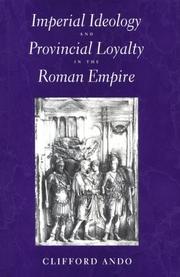
ISBN: 0520220676 9780520220676 0520280164 0520923723 1597346721 Year: 2000 Volume: 6 Publisher: Berkeley : University of California Press,
Abstract | Keywords | Export | Availability | Bookmark
 Loading...
Loading...Choose an application
- Reference Manager
- EndNote
- RefWorks (Direct export to RefWorks)
The Roman empire remains unique. Although Rome claimed to rule the world, it did not. Rather, its uniqueness stems from the culture it created and the loyalty it inspired across an area that stretched from the Tyne to the Euphrates. Moreover, the empire created this culture with a bureaucracy smaller than that of a typical late-twentieth-century research university. In approaching this problem, Clifford Ando does not ask the ever-fashionable question, Why did the Roman empire fall? Rather, he asks, Why did the empire last so long? Imperial Ideology and Provincial Loyalty in the Roman Empire argues that the longevity of the empire rested not on Roman military power but on a gradually realized consensus that Roman rule was justified. This consensus was itself the product of a complex conversation between the central government and its far-flung peripheries. Ando investigates the mechanisms that sustained this conversation, explores its contribution to the legitimation of Roman power, and reveals as its product the provincial absorption of the forms and content of Roman political and legal discourse. Throughout, his sophisticated and subtle reading is informed by current thinking on social formation by theorists such as Max Weber, Jürgen Habermas, and Pierre Bourdieu.
Allegiance --- -Political stability --- -Destabilization (Political science) --- Political instability --- Stability, Political --- Loyalty, Political --- Political loyalty --- Rome --- Cultural policy --- -Influence. --- History --- Provinces --- -Administration. --- Political stability --- Roman provinces --- Administration. --- Influence. --- Allégeance --- Stabilité politique --- Politics and government --- Administration --- Politique et gouvernement --- Histoire --- State governments --- Destabilization (Political science) --- Consensus (Social sciences) --- Legitimacy of governments --- Loyalty --- Citizenship --- Patriotism --- Rim --- Roman Empire --- Roman Republic (510-30 B.C.) --- Romi (Empire) --- Byzantine Empire --- Rome (Italy) --- Allegiance - Rome. --- Political stability - Rome. --- Influence --- administration. --- allegiance. --- ancient rome. --- ancient world. --- augustus. --- body politic. --- bourdieu. --- bureaucracy. --- central government. --- christian ideology. --- empire. --- fall of the empire. --- government. --- habermas. --- history. --- imperial identity. --- max weber. --- nonfiction. --- political consensus. --- political stability. --- politics. --- power struggle. --- power. --- provinces. --- provincial loyalty. --- revolt. --- roman emperors. --- roman empire. --- roman government. --- roman history. --- roman military. --- roman senate. --- rome. --- social formation.
| Listing 1 - 9 of 9 |
Sort by
|

 Search
Search Feedback
Feedback About UniCat
About UniCat  Help
Help News
News